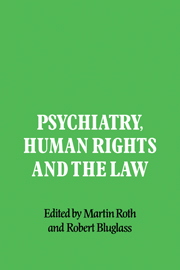Book contents
- Frontmatter
- Contents
- Editors' preface
- Contributors
- The historical background: the past 25 years since the Mental Health Act of 1959
- The social and medical consequences of recent legal reforms of mental health law in the USA: the criminalization of mental disorder
- The recent Mental Health Act in the United Kingdom: issues and perspectives
- Medical and social consequences of the Italian Psychiatric Care Act of 1978
- Lessons for the future drawn from United States legislation and experience
- Recent developments in relation to mental health and the law in the Federal Republic of Germany
- Psychopathy and dangerousness
- Dangerousness in social perspective
- Psychiatric explanations as excuses
- Detention of patients: administrative problems facing Mental Health Review Tribunals
- Developments in forensic psychiatry services in the National Health Service
- The role of psychiatry in prisons and ‘the right to punishment’
- Human rights in mental health
- Changes in mental health legislation as indicators of changing values and policies
- The Danish experience: one model of psychiatric testimony to courts of law
- A postscript on the discussions at the Cambridge Conference on Society, Psychiatry and the Law
Medical and social consequences of the Italian Psychiatric Care Act of 1978
Published online by Cambridge University Press: 04 August 2010
- Frontmatter
- Contents
- Editors' preface
- Contributors
- The historical background: the past 25 years since the Mental Health Act of 1959
- The social and medical consequences of recent legal reforms of mental health law in the USA: the criminalization of mental disorder
- The recent Mental Health Act in the United Kingdom: issues and perspectives
- Medical and social consequences of the Italian Psychiatric Care Act of 1978
- Lessons for the future drawn from United States legislation and experience
- Recent developments in relation to mental health and the law in the Federal Republic of Germany
- Psychopathy and dangerousness
- Dangerousness in social perspective
- Psychiatric explanations as excuses
- Detention of patients: administrative problems facing Mental Health Review Tribunals
- Developments in forensic psychiatry services in the National Health Service
- The role of psychiatry in prisons and ‘the right to punishment’
- Human rights in mental health
- Changes in mental health legislation as indicators of changing values and policies
- The Danish experience: one model of psychiatric testimony to courts of law
- A postscript on the discussions at the Cambridge Conference on Society, Psychiatry and the Law
Summary
Introduction
A wide-ranging debate over psychiatric care in general and the Psychiatric Care Act of 1978 in particular, has been going on at various levels of Italian society. Laymen have been expressing their views in favour of ‘open’ or ‘closed’ mental hospitals; journalists have been surveying public opinion on the question, and presenting the opinions of different sides; and psychiatrists and politicians have been tirelessly bringing forward arguments about the applicability and feasibility of the new law. Before the 1978 Act, psychiatric care in Italy had been marked by a long period of legislative inertia going back to Act 36 of 1904, which largely reflected the psychiatric legislation of other European countries. Considering the year in which it was passed, the 1904 Act was effective and commendable. It permitted the founding of new psychiatric hospitals and laid down regulations for compulsory admission. This law, however, belonged to the pretherapeutic era of psychiatry and the impact of psychopharmacology quickly made it out of date. The major shortcoming of the 1904 Act was that it lasted too long and almost exclusively provided for the admission of patients without considering how their discharge was to be achieved. Only in 1968 was the 1904 Act partly updated by the addition of article 4, which provided for voluntary admission to psychiatric institutions and for the founding of mental health centres for patients discharged from psychiatric hospitals.
- Type
- Chapter
- Information
- Psychiatry, Human Rights and the Law , pp. 32 - 42Publisher: Cambridge University PressPrint publication year: 1985
- 4
- Cited by



